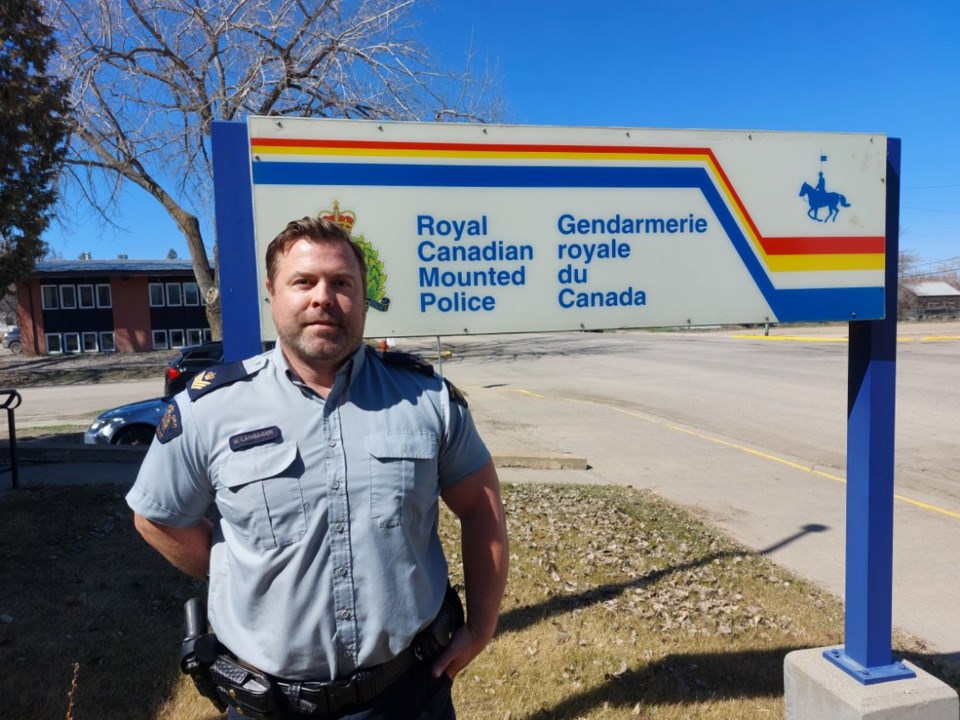The following article is in recognition of May 11 to May 17 being National Police Week in Canada.
OUTLOOK - In the event of something going bad or very traumatic in any community dotting the province and the country, the police are typically the first on the scene.
Around these parts, this includes the Outlook RCMP, overseen by Sgt. Mark Langager.
Although the Sarge is still a relatively young guy at 46 years of age, he's been a police officer for more than half his life, with 25 years to his name after deciding to join the force just into his 20's. It may not have been something he'd always wanted to do, but seeing someone on the force as he was staying with a billet family in Flin Flon at that young age helped inspire him to answer the proverbial call.
Today, the challenges being faced by the RCMP are hard to ignore. Reduced resources and limited manpower in some detachment areas due to government decisions have made officers and detachments dig deeper to maintain the level of service that the public expects, and Langager says the other challenges that the job brings can sometimes be frustrating.
"The shortages of staff can be a challenge," he said, speaking with this reporter. "Also, the catch and release policies that government courts have. It just makes our lives more difficult. We have repeat offenders, victims being re-victimized, and having the same people we deal with in court get a slap on the wrist is frustrating."
With six officers that patrol both the Outlook and Elbow detachment areas, Langager says for the detachment's call area, this number is proving to be enough for now, but for the upcoming summer season, the officers may feel themselves being stretched thin.
"For our call volume, it is enough right now," he said. "But it really cuts into training possibilities. If we have soft vacancies such as pregnancy or injury, we aren't replaced. So, we're lucky right now. We're only two short, and it's going to stay that way for quite a long time. But there are other detachments that might be too short, and so then you have lots of hours that there are no police."
For Langager, he says dealing with victims and their families can be the one aspect of his job that presents the bigger emotional hurdles, regardless of how long he's been on the job. Despite what the scene may entail, however, it's important to remain professional and empathetic to what people may be going through at that time.
"The worst part of the job, in my experience, is dealing with victims and victims' families," he explained. "We have to stay professional, but most of us are very empathetic, and a lot of times, the feelings of the victims and the victim families do really take a toll on us."
The Sarge credits local first responders and fire crews for the tireless work that they do in the event of an emergency situation. He says it's all about understanding what roles need to be filled and what needs to be done on the scene.
"The EMS and fire department here are top notch, and that's in every community that we police," said Mark. "The firefighters are trained well. They love what they do and do it well. When we get to a call with them, it's not even that we have to figure out what we're doing. We just work well together and understand each other's roles, and that's the same with EMS. Although we're different organizations, it just seems like we can work together with them very well. They do their job very well, and we just try to support them when they can and vice versa."
Langager says for anyone who may be interested in a career with the RCMP, they might want to take a look into what the job can offer them. You'll end up joining a tight-knit group of people who all carry the same unifying goal in the communities that they serve.
"Overall, we're very well taken care of," said Sgt. Mark. "Recently, the pay is very good. Benefits are good. They do take care of us and our family. We're close-knit, and you can trust the people that you're working with. You always have lots of stories to tell and every day is different; you're not tied to a desk or anything. You can choose what you're doing on most days. There are pros and cons to every job, but I could go on and on with the pros."




